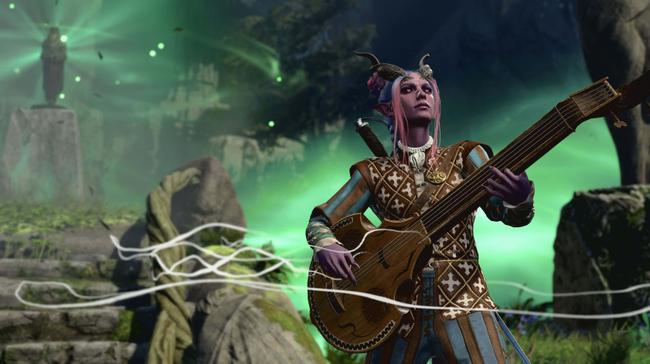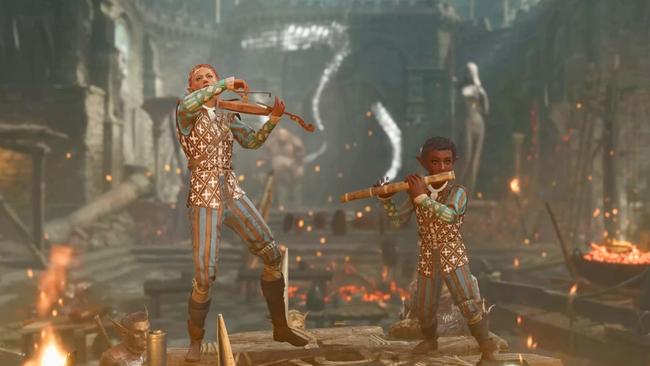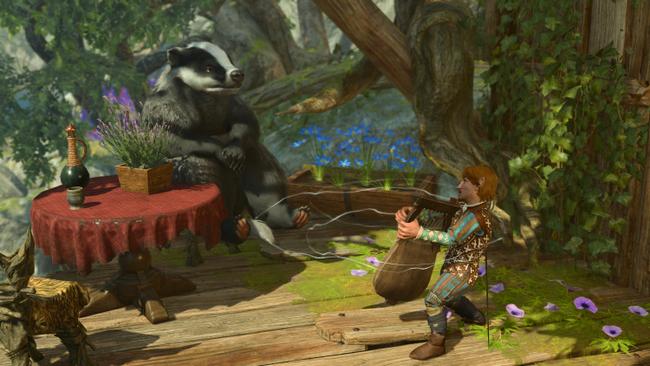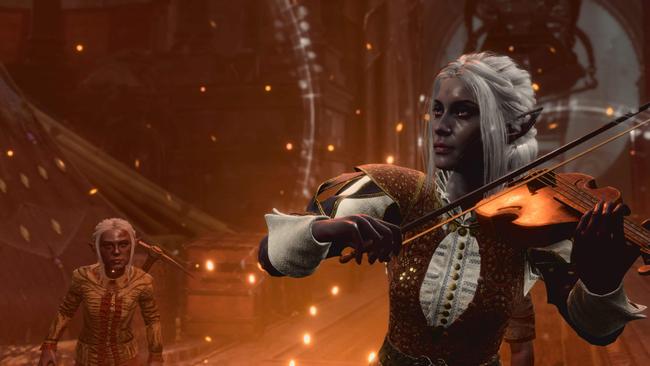
Baldur's Gate 3 Bard Class Guide - Subclasses, equipment, and multiclass suggestions
A Bard doesn’t immediately stand out as the kind of hero that leads an epic fantasy like Baldur’s Gate 3, but the truth of the Bard in Larian Studios' Dungeons & Dragons-based game is that Bards can do just about anything. The Bard is a fantastically versatile class, one capable of taking the lead in a group and even standing up in close combat with the right selection of subclass and powers. That said, the Bard is at its best as part of a team, using their unique features to assist their allies and themselves, keeping able to have a little something up their sleeve for just the right contingency. If you'd like to know more, or just toss a coin to your favorite fantasy busker, read on through RPG Site's Baldur’s Gate 3 Bard class guide.

Before You Begin
Note that none of these points are set in stone. Build your character the way you choose, and see these notes more as suggestions than rules.
This guide will also assume that you are building a custom character. Origin Characters have unique interactions and roleplaying options available thanks to their preset nature. While there are no Bard Origin Characters in the launch version of Baldur’s Gate 3 , The Dark Urge is a customizable Origin character whose class and race you can select freely.
Additionally, this guide presumes you are building a single-class character. Multiclassing into different classes as you level up is an option to gain new and useful abilities, but there’s also value in specialization. We’ll have some multiclass suggestions for you at the end of the guide. If you want some more general advice about creating your character or playing the early game, try our Character Creation Guide and Beginner's Guide.
The Bard Playstyle
Baldur’s Gate 3’s description of the Bard class focuses on its mastery of music and performance. Indeed, Bards choose a preferred instrument right as they begin the game. As part of the party and the field, though, it’s best to see the Bard as the magically-enabled counterpart to the Rogue. If a Rogue is a physical combat class that heavily emphasizes skill use and stealth, the Bard is a magical casting class that heavily emphasizes skills and party support. While both classes trade physical resilience for immense versatility, the Bard’s options powered by their adeptness at the art of performance, symbolized by their use of music and musical instruments for their greatest features.
Depending on how you build out your Bard, you'll generally not want to be right at the front line. Instead, you'll dance around the fringes and center, helping companions with a supportive tune or catching enemies in moments of weakness with a light weapon. The Bard's abilities can be tuned to specialize in manipulating a foes positions, taking advantage of their vulnerabilities, the better to end a fight before things get too hairy for the party.

Bard Class Features
- Key Abilities: Cha and Dex
- Bards use Charisma as their primary ability, which improves their spellcasting. Their high Dexterity gives them the advantage using Finesse weapons and fighting in Light Armor.
- Bards use their Cha and Dex bonuses for their saving throws.
- Gear Proficiency: Light Armor, Simple Weapons, Hand Crossbows, Longswords, Shortswords, Rapiers, and Musical Equipment.
- Bards are adept with light weapons, but in general, their talent is best put to use in spellcasting and performance. Still, a Bard player with a taste for the melee can make good use of a Finesse weapon like the Rapier, Dagger, or Shortsword. Their high Dexterity will work to their advantage there.
- Bards can also use a musical instrument to perform and entertain crowds. In the context of Baldur’s Gate 3, that means you’ll be able to use your talent in the narrative.
- Skill Proficiency: At creation, Bards can gain proficiency in any three skills from the full list of available Skills. A Bard’s high Charisma score helps immensely with skills that let the Bard do the talking, so skills like Persuasion, Intimidation, and Deception are great picks for a player Bard. Dexterity-based Skills like Sleight of Hand, Stealth, and Acrobatics can help a Bard fill in when the party lacks a Rogue or more dedicated scout.
- Bardic Inspiration: The Bard’s signature feature, Bardic Inspiration allows the Bard to buff his companions through the power of their music. An ally receiving Bardic Inspiration can add a bonus to their next Attack Roll, Ability Check, or Saving Throw. This bonus improves as the Bard gains levels.
- As Bardic Inspiration requires a long rest to recharge, it’s best to save its big buff for when it’ll count, such as when your damage dealer is about to take a big swing, or just ahead of tackling a particularly tough ability-based challenge. You can also inspire an ally that might be under threat from a hostile spell (one that has a saving throw condition, at least).
- Bard Spellcasting: Bards gain a series of Arcane spells and cantrips to select from. The spells are mostly geared towards supporting the party in combat or on an adventure, as opposed to direct damage-dealing.
- Jack of All Trades: A testament to the Bard’s sheer versatility is the Bard’s ability to add a lessened proficiency bonus to even ability checks they don’t normally have proficiency in.
- Song of Rest: Just as a good tune can help relieve stress, a Bard’s performance can keep the party going when they’re tired. Using the Song of Rest will revitalize the party, just as if they had taken a short rest. For some classes, this is enough to restore some spent spell slots, regenerate some lost HP, and recharge some abilities.
- Font of Inspiration: By the midgame, Bards can recharge their Bardic Inspiration on a short rest, instead of a long one.
- Expertise: Bards can further amp up their skill proficiencies by doubling their proficiency bonuses for selected skills.
- Countercharm: Bards can help defend their allies from mind-altering effects with a special performance. The countercharm ability buffs allied saving throws against Fear or Charm effects.
- Magical Secrets: The best artists take inspiration from a wide variety of sources, and Bards can crib spells from other spellcasting classes, using them as if they were Bard spells.
Bard Gear Recommendations
- Bards perform best in light armor and with a light weapon at their belt.
- Some subclasses can improve their performance in the melee, but in general, Bards aren’t meant to enter combat like Fighters or Paladins, and won't be able to withstand the scrum like they can.
- Though Bards are often associated with Finesse weapons and the dueling fighting style, a small shield can improve their survivability at close range.
- Have a hand crossbow in your inventory to make use of ranged attacks while the tougher members of the party hold the front line.

Bard Subclasses
At Level 3, you’ll choose a Subclass of Bard to become. At launch, your choices of “Bard College” in Baldur’s Gate 3 are the College of Lore, College of Valor, and College of Swords. Your choice of subclass will help shape your play style and the options available to you in combat.
College of Lore
The College of Lore Bard is a bard that sniffs at the thought of going into a fight swinging their weapon around. Lore Bards focus more on spellcasting and performance-based features, letting the hacking and slashing be handled by the party’s resident melee specialists (Fighters, Barbarians, and the like). Lore Bards also gain the ability to harm an enemy with a reversed form of Bardic Inspiration - Cutting Words.
College of Lore Subclass Features
- Bonus Skill Proficiency: Arcana, Intimidation, Slight of Hand
- Cutting Words: Use your wit to distract, confuse, and demoralize an enemy. As a reaction, you can use a charge of Bardic Inspiration to penalize a creature’s attack roll, ability check, or damage roll.
- Additional Magical Secrets: Lore Bards gain an earlier, additional version of the Bard’s Magical Secrets feature, allowing them to plunder spells from other class’ spell lists for useful options.
College of Valor
The “warrior-poets” of the Bardic tradition, Bards of the College of Valor focus on witnessing the deeds of heroes while fighting alongside them. To that end, they gain a wider weapon and gear selection, and an upgraded version of Bardic Inspiration that makes allies even more potent in combat.
College of Valor Subclass Features
- Bonus Gear Proficiency: Medium Armor, Shields, Martial Weapons
- Combat Inspiration: An upgrade to Bardic Inspiration that adds a damage and Armor Class boost to the effects of standard Bardic Inspiration.
- Extra Attack: Valor Bards gain a Fighter-like extra attack during their turn, making them more effective in direct combat.
College of Swords
The epitome of the entertaining swashbuckler, Bards from the College of Swords (called “Blades”) dance to the music of weapons clashing. Consummate duelists, Blades channel their spellcasting through their weapons and take up a fighting style, making them much more capable in a fight.
College of Swords Subclass Features
- Bonus Gear Proficiency: Medium Armor, Scimitar
- Fighting Style: Blades can adopt a fighting style, granting passive benefits when using certain weapons.
- Dueling: +2 damage when wielding a melee weapon in one hand with the other hand empty.
- Two-Weapon Fighting: Add ability modifier to damage rolls for the off-hand weapon.
- Blade Flourish: Increases the Blade’s movement speed for the rest of the turn when taking an attack action. The attack action can also gain a Flourish effect:
- Defensive Flourish: Use a charge of Bardic Inspiration to deal extra damage and boost your AC until your next turn.
- Slashing Flourish: Spend a charge of Bardic Inspiration to deal extra damage to the target and to another target in melee range.
- Mobile Flourish: Spend a charge of Bardic Inspiration to deal extra damage and move the target a short distance away while still closing to within melee range.
- Extra Attack: Blades gain a Fighter-like extra attack during their turn, making them more effective in direct combat.

Bard Level Progression
These are the class features you’ll get as you level up as a Bard. The maximum level cap in Baldur’s Gate 3 at launch is Level 12. Use this to see what you’ll get at each level and plan accordingly, in case you wish to multiclass.
This guide will also highlight class features you gain based on your subclass choice. For more detailed info about the subclasses, see the sections above. Features gained by a Subclass are labeled with the Subclass name.
Note: Unlabeled benefits are “standard” class features and common to all subclasses.
Level 1
- Bardic Inspiration: Boost an ally’s rolls with a performance.
- Bardic Spells:
- 2 Cantrips
- 2 Level 1 spell slots
- 4 spells known
- Musical Instrument: Choose from Hand Drum, Flute, Lute, Lyre, Violin
Level 2
- Bardic Spells:
- +1 spell known (5 total)
- +1 Level 1 Spell Slot (3 total)
- Jack of All Trades: Add half proficiency bonus to ability checks without proficiency.
- Song of Rest: Perform to restore the party as if it had taken a short rest.
Level 3
- Subclass Choice: Choose a Bard Colleg to proceed in (College of Lore, College of Swords, College of Valor).
- Bardic Spells:
- +1 Level 1 spell slot (4 total)
- +1 spells known (6 total)
- 2 Level 2 spell slots
- Expertise: Double proficiency bonus for 2 chosen skills
- College of Valor: Gear Proficiency: Medium Armor, Shields, Martial Weapons
- College of Valor: Combat Proficiency: Enhance buffs for allies
- College of Lore: Cutting Words: Debuff foes with Bardic Inspiration
- College of Lore: Skill Proficiency: Arcana, Intimidation, Sleight of Hand
- College of Swords: Gear Proficiency: Medium Armor, Scimitar
- College of Swords: Fighting Style: Choose 1 from: Two-weapon fighting, Duelist/
- College of Swords: Blade Flourish: Spend Bardic Inspiration to enhance melee attacks.
Level 4
- Bardic Spells:
- +1 Level 2 Spell slot (3 total)
- +1 spells known (7 total)
- +1 Cantrips known (3 total)
- Feat Selection: Can pick a Feat from All Classes Feat list. While any class at level 4 can pick any of the Feats, not all will be relevant to the class. You can also choose an ability improvement to boost a bonus or eliminate a penalty.
- For Bards, we recommend one of the following Feats:
- Ability Improvement - 2 points to distribute to any Ability score (to max of 20).
- Defensive Duelist - When equipped with Finesse weapon, +2 to AC when attacked in melee (as reaction)
- Mobile - Increases Move speed, Dash distance becomes unaffected by terrain. When moving after a melee attack, you do not provoke an Opportunity Attack.
- Magic Initiate: Sorcerer - Learn 2 cantrips, 1 Level 1 spell from Sorcerer Spell List. Use Cha modifier for spellcasting.
- Magic Initiate: Warlock - Learn 2 cantrips, 1 Level 1 spell from Warlock Spell List. Use Cha modifier for spellcasting.
- Shield Master - +2 to Dex Saving throws when using a Shield. On successful Dex saves with a shield, you take no damage.
- Skilled - Gain Proficiency in 3 Skills of your choice.
- Tough - +2 HP per level
- Weapon Master - +1 to Str or Dex, gain Proficiency with 4 weapons of your choice.
- For Bards, we recommend one of the following Feats:
Level 5
- Bardic Spells:
- 2 Level 3 spell slots
- +1 spells known (8 total)
- Improved Bardic Inspiration: Bardic Inspiration buffs strengthen further
- Font of Inspiration: Recharge Bardic Inspiration on short rest
Level 6
- Bardic Spells:
- +1 spells known (9 total)
- Countercharm: Use performance to improve party defenses against fear and charm effects.
- College of Lore: Additional Magical Secrets: Pick two castable spells from any class to cast as Bard Spells
- College of Valor: Extra Attack: Attack twice per turn.
- College of Swords: Extra Attack: Attack twice per turn.
Level 7
- Bardic Spells:
- +1 Level 3 spell slots (3 total)
- 1 Level 4 Spell slot
- +1 spells known (10 total)
Level 8
- Bardic Spells:
- +1 Level 4 Spell slot (2 total)
- +1 spells known (11 total)
- Feat Selection: Can pick a Feat from All Classes Feat list or Ability Score Improvement.
Level 9
- Bardic Spells:
- 1 Level 5 Spell slot
- +1 spells known (12 total)
- Improved Song of Rest
Level 10
- Bardic Spells:
- +1 Level 5 Spell slot (2 total)
- +2 spells known (14 total)
- +1 cantrip known
- Improved Bardic Inspiration
- Expertise: Double proficiency bonus for 2 chosen skills
- Magical Secrets: Pick two castable spells from any class to cast as Bard Spells
Level 11
- Bardic Spells:
- 1 Level 6 Spell slot
- +1 spells known (15 total)
Level 12
- Feat Selection: Select a feat or improve an Ability Score.

Multiclass Bards
Bards are quite versatile as both spellcasters and short-range skirmishers, and they’re surprisingly capable even when splitting levels between other classes. A Bard with an eye to broaden their capabilities can find a lot of use out of taking levels for certain other classes, though one will want to keep an eye on what could be given up in terms of additional skills and Bard-specific features.
Bards can find quite a bit of utility from taking on a Warlock level or two. Warlocks have access to Eldritch Blast, one of the most powerful damage-dealing cantrips in the game, which could improve a Bard’s ability to deal magical damage from afar, rather than risking their neck in melee. Warlocks also use Charisma as their primary stat, which any Bard will have in spades.
Similarly to Warlock, Bards can get significant benefits from levels in Sorcerer. Sorcerers are also Charisma-based casters, so a Bard with Sorcerer levels won’t be hamstrung trying to spread their ability points around. That said, multiclassed Bard/Sorcerers won’t have many high-level spells to play with, potentially reducing the potency of their magic.
At least 2 levels of Paladin will grant the Bard access to the powerful Lay on Hands, Divine Sense, and Divine Smite abilities, as well as some rudimentary Fighting Style and Divine spellcasting features. Paladins also use Charisma as their spellcasting ability, which will keep a Bard/Paladin's spells potent.
A Valour or Lore Bard that takes on a level of Fighter can benefit from the addition of a Fighting Style perk, gaining at least some of the benefit of the College of Swords (though Bard/Fighters will still miss out on a Blade's more unique flourish-based abilities). Fighters can also use Action Surge, a powerful ability that can grant a Bard extra actions to do as they please with. Just don’t bother putting on medium or heavy armor.
The ultimate ultra-versatile skill-based character is a Bard with a level or two of Rogue. Skill-wise, Bards actually have the better spread of proficiencies to choose from, but gaining access to some Rogue-specialty disciplines like stealth, trap detection, sneak attacks, and thieves’ tools can help a Bard fill the gap in parties without dedicated Rogues.